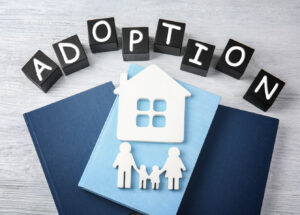Pregnancy/Motherhood – Five-Part Series
The road to, through, and during motherhood is infused with so many conflicting emotions. Women do not always feel comfortable admitting to, or even openly expressing, the extreme emotions which surface. As women fall into the expectations of society, family, and friends, most do not recognize their experiences create a significant change, and therefore a need to grieve.
In the third of this five-part series we explore motherhood through the contribution of others. Surrogacy and adoption provide the opportunity for a woman to become a mother, once the baby has been born to another. This experience can be complicated, and it can be riddled with conflicting emotions from both sides. Discovering the unique emotional challenges of releasing or receiving a baby after it reaches full-term, and the importance of processing the accompanying emotions, is essential to all parties.
— — —

Part Three: Surrogacy and Adoption
Grief is the normal and natural reaction after experiencing an emotional loss of any kind. Grief can also be the conflicting emotions we feel when there is a change in something which was familiar. Whether you are the surrogate, the parent surrendering your child for adoption, or the individual receiving the new arrival, emotions can be triggered by this event.
“Babies born through surrogacy are conceived with the intention that they will be raised by the intended parents, not by the birth” mother.[i] Women, who choose to have a child for another, are very clear on their intentions and, for the most part, are happy to give the baby to the intended parents.
For those who do not understand surrogacy, there can be an assumption the birthing mother will grieve the loss of the baby. Most surrogates do not relate to the baby in this way. Some surrogates admit they can grieve the loss of the friendship formed with the intended parents, they can grieve an unpleasant relationship with the intended parents, or they can grieve the end of the experience.
The surrogate must still work through the hormones, and the rollercoaster of emotions, associated with giving birth. While the experience will be different for everyone, there can be feelings of sadness or of being overwhelmed.
For the parent releasing their child for adoption, the birth mother has, like the surrogate, carried this baby inside her body for the past nine months. She has felt this baby move, she has experienced the physical changes, and now she too is leaving the birthing process without the baby. Again, the emotional impact of this experience will be different for each woman.
A birth parent, surrendering their child to another family may experience a range of conflicting emotions such as relief and gratitude to anxiousness and despair. The experience itself can create unresolved emotions based on the level of support received from the agency or hospital. She may also grieve the loss of the parenting experience; thoughts of what could have been, or of not being able to witness who their child grows up to be.
If the child is older than a newborn, the emotions of not seeing their child again, even though they believe it is the best decision, can be heart-breaking. The ability to process these emotions is essential to being able to walk away, with confidence and inner peace.
For the new mother, even though this is something she has been looking forward to for months, she too can experience the emotional loss of the experiences which led to the birth or adoption.
New mothers, especially those who have received their baby from another, can ride a rollercoaster of emotions including fear, shock, gratitude, and confusion. If the baby was received through surrogacy there may be mutual joy. However, if the baby was received from a birth mother, surrendering their child for adoption, there may be a mixture of self joy and sadness for the other woman. There may even be feelings of guilt as a dream has come true for her, but a dream has been lost by another. In the case of an adoption there is also a time of uncertainty which can lead to confusion and anxiety.
Whether you have experienced any of these situations, but especially if you have not, do not assume you know what another is feeling. Each individual will experience their own emotions, based on the relationship they have developed between themselves, the birth mothers, and the baby. The best we can do is be supportive and provide a listening ear when needed.
For any of the women involved in a shared pregnancy, look beyond the traditional definition of grief. If emotions remain incomplete or unfinished, take steps to resolve them. Many have spent years, me included, not living life fully because our present life is being filtered through the unresolved emotions of our past.
Grief is cumulative and comes in many forms. Often times we deny its existence simply because we do not understand the definition. Surrogacy is complex. Adoption is complex. Motherhood is complex. If emotions arise which need attention, please do not shy away because you believe it isn’t grief.
“Little souls find their way to you, whether they’re from your womb or someone else’s.” Sheryl Crow
Tammy Adams, Certified Coach Practitioner offering support, in-person or online, Canada-wide.
She is certified in The Grief Recovery Method®, Personality Dimensions™, Reiki, Access Bars®, and Mindfulness. To learn more about the services she offers, book a 20-minute free phone consult.
[i] https://sarahjefford.com/how-does-it-feel-to-give-away-a-baby/#:~:text=Babies%20born%20through%20surrogacy%20are,be%20handing%20over%20the%20baby.












 Sharon Walker, MSW, RSW
Sharon Walker, MSW, RSW Jordon Iorio Hons. BA, RSW
Jordon Iorio Hons. BA, RSW Christine Bibby, B.S.W., M.S.W., R.S.W.
Christine Bibby, B.S.W., M.S.W., R.S.W. Brianna Kerr, RSW
Brianna Kerr, RSW Danielle Vanderpost, RSW
Danielle Vanderpost, RSW Daniela Switzer, MA, C.PSYCH
Daniela Switzer, MA, C.PSYCH Tammy Adams
Tammy Adams Jade Bates, RMT
Jade Bates, RMT Caitlin Schneider
Caitlin Schneider Dr. Crysana Copland
Dr. Crysana Copland
 Amy Dougley
Amy Dougley Emily Kamminga
Emily Kamminga Bill Dungey, RSW
Bill Dungey, RSW



 Jessica Moore, RSW
Jessica Moore, RSW Abigail Wragge, RSW
Abigail Wragge, RSW Melanie Clucas
Melanie Clucas Ally Legault
Ally Legault Kunle Ifabiyi
Kunle Ifabiyi Tammy Prince
Tammy Prince
